The Nerve To Lead Podcast
with Sangheetha Parthasarathy
On The Nerve to Lead podcast, your host, Sangheetha Parthasarathy encourages CEOs, Entrepreneurs, deep thinkers, the round-pegs-in-square-holes, change-makers and visionaries to share their stories of power, pleasure and passion.
We cover everything from nervous system regulation, high achievement, trauma healing, parenting, partnership and attachment, intimacy and more. You will also get to learn the stories and knowledge from our expert guests and thought leaders.
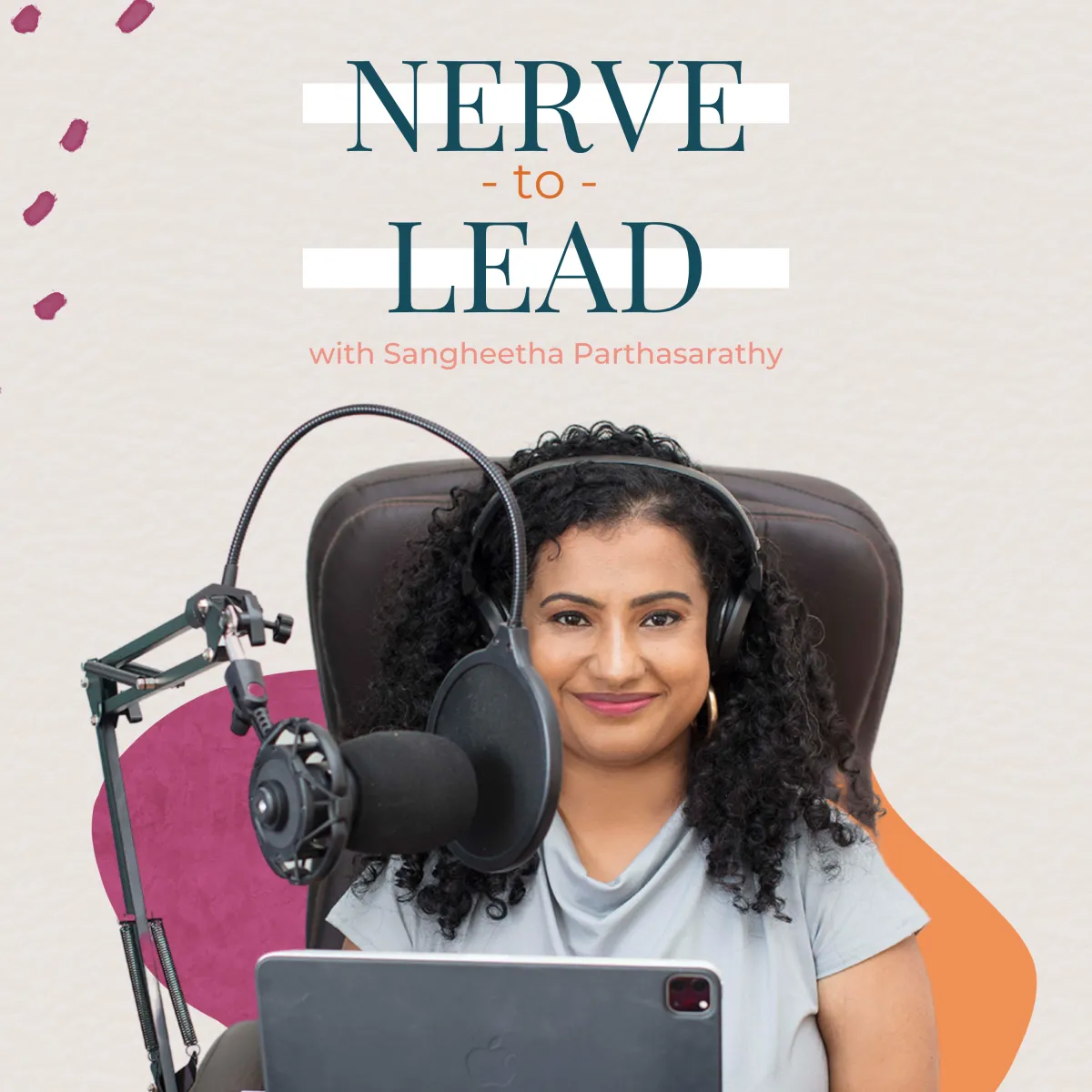
Apply to be a guest on
Nerve to Lead Podcast
Welcome to 'Nerve to Lead' podcast. Apply here to be a guest on the podcast with Sangheetha Parthasarathy.
Invite Sangheetha as a
guest to your podcast
Invite Sangheetha, a Nervous System Coach, Speaker and Consultant to be a guest on your podcast.
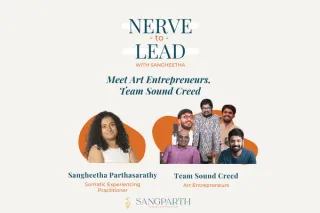
Meet Art Entreprenuers , Team Sound Creed.
Meet Art Entreprenuers , Team Soundcreed. ...more
Podcast
July 21, 2023•21 min read
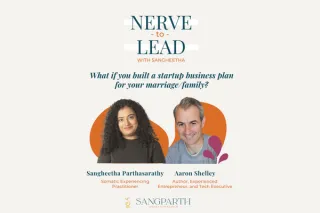
What if you built a startup business plan for your marriage/family ?
What if you built a startup business plan for your marriage/family ? ...more
Podcast
July 21, 2023•30 min read
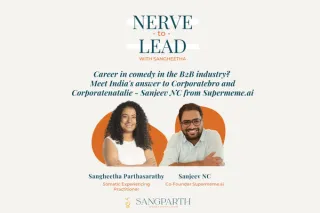
Career in comedy in the B2B Industry ? Meet India's answer to Corporatebro and Corporatenatalie - Sanjeev NC from Supermeme.ai
Career in comedy in the B2B Industry ? Meet India's answer to Corporatebro and Corporatenatalie - Sanjeev NC from Supermeme.ai ...more
Podcast
July 21, 2023•16 min read
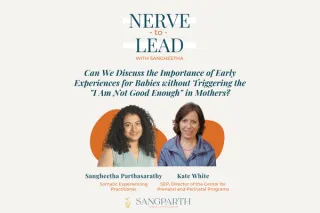
Can We Discuss the Importance of Early Experiences for Babies without Triggering the "I Am Not Good Enough" in Mothers?
Can We Discuss the Importance of Early Experiences for Babies without Triggering the "I Am Not Good Enough" in Mothers? ...more
Podcast
July 21, 2023•24 min read
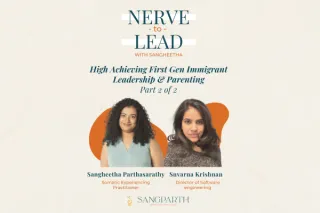
High Achieving First Gen Immigrant Leadership & Parenting - Part 2 of 2
High Achieving First Gen Immigrant Leadership & Parenting ...more
Podcast
March 31, 2023•21 min read
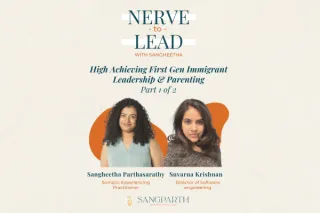
High Achieving First Gen Immigrant Leadership & Parenting - Part 1 of 2
High Achieving First Gen Immigrant Leadership & Parenting ...more
Podcast
March 31, 2023•22 min read
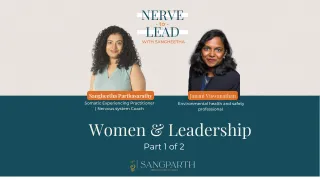
Women & Leadership (Part 1 of 2)
Women and Leadership, a first generation BIPOC woman in leadership - what are some of the unique aspects of this journey ? Join me in conversation with Janani Vishwanathan as we explore the somatics o... ...more
Podcast
February 14, 2023•1 min read
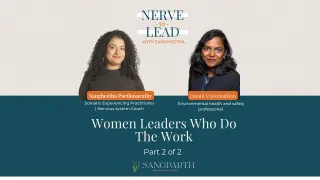
Women Leaders Who Do The Work (Part 2 of 2)
What is the importance of women leaders investing in good quality nervous system regulation? How does one choose a therapist ? What is nervous system safety ? How does doing the work impact parenting ... ...more
Podcast
February 14, 2023•1 min read
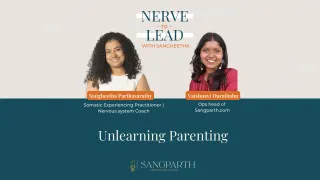
Unlearning Parenting
Welcome to the Nerve to Lead podcast. Here we explore power, pleasure, leadership, identity, belonging, parenting, and couplehood, and explore stories of navigating through life, finding both authenti... ...more
Podcast
February 14, 2023•1 min read
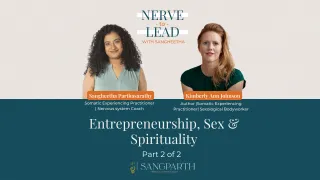
Entrepreneurship, Sex & Spirituality (Part 2 of 2)
Kimberly Ann Johnson is a bestselling author, doula and entrepreneur. In part two of my conversation we discuss motherhood, sex, sexuality, high achievement immigration, and many aspects of South Asia... ...more
Podcast
February 14, 2023•2 min read
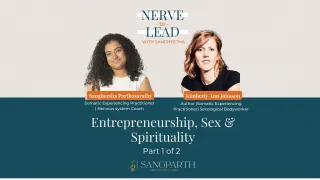
Entrepreneurship, Sex & Spirituality (Part 1 of 2)
Kimberley Ann Johnson is a bestselling author, doula and entrepreneur. In part one of my conversation, we discuss entrepreneurship, sex, spirituality and the South Asian nervous system through the pos... ...more
Podcast
February 14, 2023•1 min read
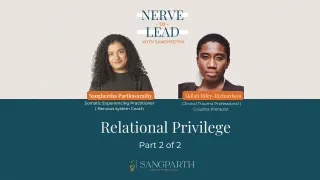
Relational Privilege (Part 2 of 2)
Welcome to episode four with Akilah Riley Richardson who is a couples therapist. In this episode we go deep into Akiliah's model for decolonizing couples therapy work and explore concepts of her P.R.I... ...more
Podcast
February 14, 2023•1 min read
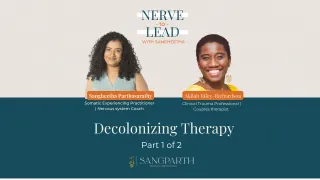
Decolonizing Therapy (Part 1 of 2)
Welcome to episode three with Akilah Riley Richardson who is a couple's therapist. In this episode we talk about what it is like to be a woman of color from the global majority in terms of the thinkin... ...more
Podcast
February 14, 2023•1 min read
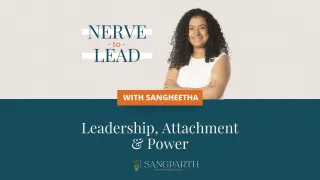
Leadership, Attachment & Power
Welcome to episode two, where Sangheetha talks about leadership, power, attachment and the power of doing the work to show up as an embodied leader, what some somatic patterns and considerations are w... ...more
Podcast
February 14, 2023•1 min read

Meet your host Sangheetha Parthasarathy of Sangparth.com
Welcome to "Nerve to Lead". You meet your host Sangheetha Parthasarathy in this episode, a bit more about her journey and what you can expect out of this podcast. ...more
Podcast
February 14, 2023•1 min read
What we offer
Our Areas Of Focus

Career, Entrepreneurship& Leadership

Sex, Relationships
& Parenthood

Eating, Movement &
Body Image
